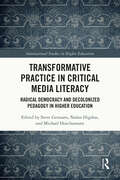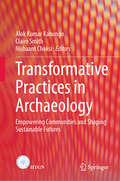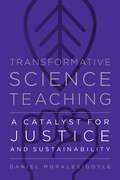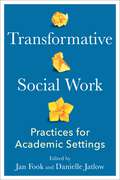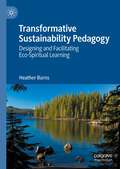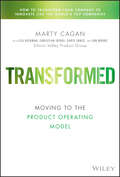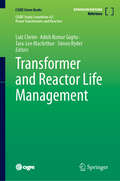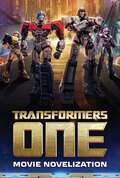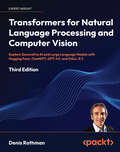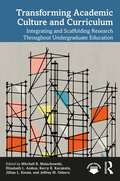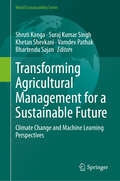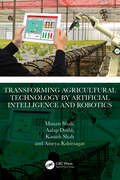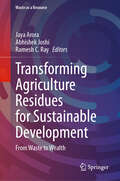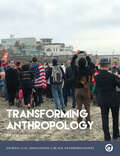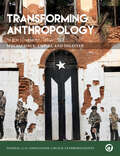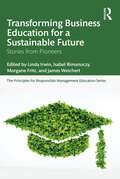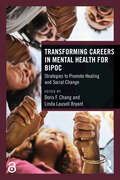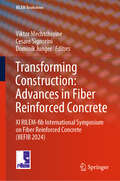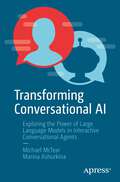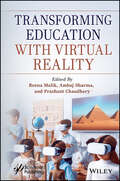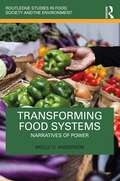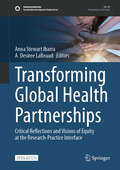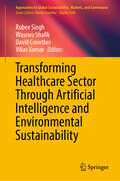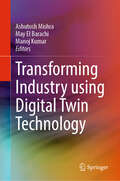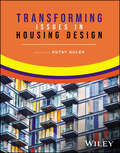- Table View
- List View
Transformative Practice in Critical Media Literacy: Radical Democracy and Decolonized Pedagogy in Higher Education (International Studies in Higher Education)
by Michael Hoechsmann Nolan Higdon Steve GennaroTransformative Practice in Critical Media Literacy brings together a diverse selection of essays to examine the knowledge production crisis in higher education and the role that news media and technology play in this process.This text highlights the importance of radical pedagogy and critical media literacy to fight back and reclaim higher education as the battleground for democracy and the embodiment of citizenship. Using a global and social justice lens, it explores the transformative potential of critical media literacy in higher education. It also provides real examples of current critical media literacy practices around the globe and of successful experiences inside classrooms. In an era of fake news, this text fulfils the yearning for critical media literacy to permeate higher education by drawing together practitioners and scholars speaking to journalism students, teacher candidates, and to students, scholars, and activists across a variety of spaces in higher education.This book will be a key resource for scholars, students, policymakers, community members and activists interested in education, politics, youth studies, critical theory, intersectionality, social justice and peace studies, activism, critical media literacy, communication, or media studies.
Transformative Practices in Archaeology: Empowering Communities and Shaping Sustainable Futures
by Claire Smith Nishaant Choksi Alok Kumar KanungoThe volume introduces a diverse range of themes and practices relating to sustainable heritage management. Each paper delves into the challenges, successes, and failures of preserving precious cultural heritage. It discusses various strategies, such as the early inclusion of archaeology in UNESCO frameworks to leveraging archaeological findings and indigenous knowledge for sustainable development goals. The chapters explore the evolution of autoarchaeology as a tool for empowering Indigenous communities to assert their human rights and integrating oral histories and local ecological knowledge to interpret ancient remains. Additionally, it highlights the value of archaeologists working more closely with Indigenous peoples, local communities, and other disciplines in identifying, preserving, conserving and managing heritage sites. It appeals to archaeologists, anthropologists, cultural geographers, cultural heritage professionals and others seeking new ways to protect cultural heritage.
Transformative Science Teaching: A Catalyst for Justice and Sustainability
by Daniel Morales-DoyleA call to action championing equity and social justice in K–12 science curriculum
Transformative Social Work: Practices for Academic Settings
by Fook, Jan; Jatlow, DanielleTransformative approaches to social work have been popular for some time. Most discussions of this perspective, however, focus on actual practice with clients or service users, not educational contexts. In addition, there is often a lack of clarity about what “transformative” really means, both in theory and in practice.This book brings together a range of contributors to reconsider transformative social work, focusing on concrete examples in academic settings both inside and outside the classroom. They illustrate theories and practices of transformative social work in the academy in detail from different standpoints. Chapters by scholars at all career stages, students, staff, and managers consider all aspects of academic work—teaching and learning, research, and administration—as well as labor that academics perform outside the university. Authors describe their understanding of a transformative perspective as well as the practices that flow from this conception, providing rich detail on how a transformative approach can be implemented.This book stands out for the breadth of its focus, its international contributions, and its openness about the new challenges involved in doing transformative work today. It develops an expansive and systematic understanding of what “transformative” can mean across the entire academic and professional context of social work education.
Transformative Sustainability Pedagogy: Designing and Facilitating Eco-Spiritual Learning
by Heather BurnsThis book offers stories and tools for designing and facilitating transformative sustainability pedagogy and explores how educators can intentionally design and facilitate eco-spiritual learning that promotes healing and wholeness. In these times of accelerating climate change and systemic injustice, we need learning spaces that both challenge our unsustainable dominant paradigms and support us in re-learning how to live in relational and regenerative ways. Rooted in the paradigm of interconnection and relationality, this book offers practical ways to design and facilitate learning toward more just, ecological, and spiritual ways of being. The author weaves together a variety of personal stories of teaching and learning, an exploration of how new science can be applied to transformative sustainability pedagogy, and eco-spiritual practices to help educators nurture wholeness and connection in themselves and in learning spaces.
Transformed: Moving to the Product Operating Model (Silicon Valley Product Group)
by Marty CaganHelp transform your business and innovate like the world's top tech companies! In INSPIRED, product thought leader Marty Cagan revealed the best practices and techniques used by the top product teams operating in the product model. Next, EMPOWERED shared the best practices and techniques used by the top product leaders to provide their teams with the kind of environment they need to thrive in the product model. Yet, the most common question after reading INSPIRED and EMPOWERED has been: "Yes, we want to work this way, but the way we work today is so different, and so deeply ingrained, is it even possible for a company like ours to transform to the product model?" TRANSFORMED was written to bridge the gap between where most companies are right now and where they need to be. The leaders of these companies know they must transform to compete in an era of rapidly changing enabling technology, but most of them have never operated this way before. TRANSFORMED has three big goals: First, the book will educate you with a deep understanding of the product operating model, and what it means to work that way. Second, the book will convince you with detailed case studies of successful transformations, that while difficult, it is absolutely possible for you to transform your company to the product operating model. Third, the book will inspire you with truly impressive case studies of product innovation, showing what you too will be capable of doing once you successfully transform. TRANSFORMED is written for those driving change, including the senior company leaders—starting with the CEO—as well as the senior executives and stakeholders who need to collaborate with the product teams, the product leaders, the members of the product teams, and all those who either support or depend on these product teams. Written by best-selling author Marty Cagan and his partners at the Silicon Valley Product Group, TRANSFORMED is filled with real-world examples and proven, practical advice from their decades of experience helping companies move to the product operating model.
Transformer and Reactor Life Management (CIGRE Green Books)
by Tara-Lee MacArthur Simon Ryder Luiz Cheim Adish Kumar GuptaThis Green Book provides a comprehensive guide to transformer and reactor life management, from procurement to disposal. Transformers and reactors are among the most expensive components in the power system and contribute to a large proportion of its losses. Transformers also have long lives - more 40 years in many cases. Making the wrong decisions on their life management can have serious and long-lasting consequences. The book is a reference for anyone involved in transformer and reactor life management. This includes not only operators, but also maintenance, repair, testing, and disposal contractors. Each of the main steps is described in its own chapter, with special emphasis on diagnosing and resolving transformer and reactor problems. Each chapter has been written by experts in the field, and then reviewed in detail by the editorial panel. In addition, the editorial panel has tried to ensure a clear and consistent use of terminology. The book provides those involved in transformer and reactor life management with comprehensive guidance on industry best practices and how to avoid wrong decisions. Readers who would like to comment on any of the published books or identify errors to the editorial team please contact: cigregreenbooks@springer.com.
Transformers One Movie Novelization (Transformers One)
by Ryder WindhamParamount&’s animated film Transformers One starring Chris Hemsworth, Scarlett Johansson, Brian Tyree Henry, and Keegan-Michael Key flies into theaters this fall! Don&’t miss this action-packed novelization that comes with an eight-page, full-color section with stills from the movie!TRANSFORMERS ONE is the untold origin story of Optimus Prime and Megatron, known as sworn enemies, but who once were friends bonded like brothers who changed the fate of Cybertron forever. The first-ever fully CG-animated Transformers movie, TRANSFORMERS ONE features a star-studded voice cast, including Chris Hemsworth, Brian Tyree Henry, Scarlett Johansson, Keegan-Michael Key, and Steve Buscemi with Laurence Fishburne and Jon Hamm. TRANSFORMERS and HASBRO and all related trademarks and logos are trademarks of Hasbro, Inc. ©2024 Hasbro. ©2024 Paramount Pictures Corporation.
Transformers for Natural Language Processing and Computer Vision: Explore Generative AI and Large Language Models with Hugging Face, ChatGPT, GPT-4V, and DALL-E 3
by Denis RothmanThe definitive guide to LLMs, from architectures, pretraining, and fine-tuning to Retrieval Augmented Generation (RAG), multimodal AI, risk mitigation, and practical implementations with ChatGPT, Hugging Face, and Vertex AIKey FeaturesCompare and contrast 20+ models (including GPT, BERT, and Llama) and multiple platforms and libraries to find the right solution for your project Apply RAG with LLMs using customized texts and embeddings Mitigate LLM risks, such as hallucinations, using moderation models and knowledge bases Purchase of the print or Kindle book includes a free eBook in PDF formatBook DescriptionTransformers for Natural Language Processing and Computer Vision, Third Edition, explores Large Language Model (LLM) architectures, practical applications, and popular platforms (Hugging Face, OpenAI, and Google Vertex AI) used for Natural Language Processing (NLP) and Computer Vision (CV). The book guides you through a range of transformer architectures from foundation models and generative AI. You’ll pretrain and fine-tune LLMs and work through different use cases, from summarization to question-answering systems leveraging embedding-based search. You'll also implement Retrieval Augmented Generation (RAG) to enhance accuracy and gain greater control over your LLM outputs. Additionally, you’ll understand common LLM risks, such as hallucinations, memorization, and privacy issues, and implement mitigation strategies using moderation models alongside rule-based systems and knowledge integration. Dive into generative vision transformers and multimodal architectures, and build practical applications, such as image and video classification. Go further and combine different models and platforms to build AI solutions and explore AI agent capabilities. This book provides you with an understanding of transformer architectures, including strategies for pretraining, fine-tuning, and LLM best practices. What you will learnBreakdown and understand the architectures of the Transformer, BERT, GPT, T5, PaLM, ViT, CLIP, and DALL-E Fine-tune BERT, GPT, and PaLM models Learn about different tokenizers and the best practices for preprocessing language data Pretrain a RoBERTa model from scratch Implement retrieval augmented generation and rules bases to mitigate hallucinations Visualize transformer model activity for deeper insights using BertViz, LIME, and SHAP Go in-depth into vision transformers with CLIP, DALL-E, and GPTWho this book is forThis book is ideal for NLP and CV engineers, data scientists, machine learning practitioners, software developers, and technical leaders looking to advance their expertise in LLMs and generative AI or explore latest industry trends. Familiarity with Python and basic machine learning concepts will help you fully understand the use cases and code examples. However, hands-on examples involving LLM user interfaces, prompt engineering, and no-code model building ensure this book remains accessible to anyone curious about the AI revolution.
Transforming Academic Culture and Curriculum: Integrating and Scaffolding Research Throughout Undergraduate Education
by Mitchell R. MalachowskiInstitutions across the higher education landscape vary, and each navigates change in its own way. This volume describes how institutions and departments influence the success of structural and cultural transformations to advance curricular reform.A product of the Council on Undergraduate Research Transformations project, a six-year, longitudinal research study funded by the United States National Science Foundation, this text features the goals, strategies, and outcomes that evolved from the experiences at 12 diverse colleges and universities in creating innovative undergraduate curricula and campus cultures that maximize student success. With the goal of achieving departmental transformations in both student learning and academic culture – by backward-designing and scaffolding research into and across undergraduate curricula – editors include scholarly findings, step-by-step guides, and a toolkit section, with plentiful online resources, to help readers develop and execute personalized change processes on their own campuses.Designed to span both theory and practice for departments and institutions to transform undergraduate education to increase student success, this book is vital for all higher education scholars, practitioners, faculty, staff, and leaders interested in creating research-rich curricula and change more broadly.Visit the Council on Undergraduate Research website here: https://www.cur.org/.
Transforming Agricultural Management for a Sustainable Future: Climate Change and Machine Learning Perspectives (World Sustainability Series)
by Shruti Kanga Suraj Kumar Singh Khetan Shevkani Vamdev Pathak Bhartendu Sajan"Transforming Agricultural Management for a Sustainable Future: Climate Change and Machine Learning Perspectives" is an essential read for anyone interested in the future of agriculture and the role that technology can play in mitigating the impact of climate change. The book delves into the challenges facing agriculture today, such as climate change, soil degradation, and water scarcity. It then explores how machine learning can be used to overcome these challenges and promote sustainable agricultural practices. One of the key takeaways from the book is the importance of data-driven decision-making in agriculture. With the help of machine learning algorithms, farmers can analyze vast amounts of data, such as weather patterns, soil quality, and crop yields, to make informed decisions about planting, irrigation, and fertilizer use. By using this data, farmers can optimize their yields while minimizing their impact on the environment. Another important aspect of the book is its focus on climate change. Agriculture is one of the largest contributors to greenhouse gas emissions, and farmers are already feeling the impact of climate change through droughts, floods, and other extreme weather events. The book provides a comprehensive overview of the ways in which machine learning can be used to reduce the impact of agriculture on the environment, such as by optimizing irrigation and reducing fertilizer use. The book also explores the role of technology in promoting sustainable agriculture practices. For example, precision agriculture techniques, such as GPS-guided tractors and drones, can help farmers reduce waste and improve crop yields. The book provides examples of how these techniques are already being used in practice, and how they can be further developed to promote sustainability. Overall, "Transforming Agricultural Management for a Sustainable Future: Climate Change and Machine Learning Perspectives" is an insightful and informative read for anyone interested in the future of agriculture. The book provides a comprehensive overview of the challenges facing agriculture today and the ways in which technology can be used to overcome these challenges and promote sustainable practices. It is a must-read for farmers, policymakers, and anyone interested in the future of our planet.
Transforming Agricultural Technology by Artificial Intelligence and Robotics
by Manan Shah Ameya Kshirsagar Aalap Doshi Kanish ShahThis book discusses major issues in the field of agriculture: crop diseases, lack of storage management, pesticide control, weed management, lack of irrigation and water management and their effective resolution via automation, including IoT, wireless communications, machine learning, artificial intelligence, and deep learning. It further discusses the sterile insect technique, which is a replacement of conventional pesticide and fertilizer techniques. Hydroponics and vertical farming, two of the top-ranked agricultural engineering accomplishments of the past century, are also discussed. Features: Offers in-depth insights regarding the fundamentals of technologies associated with the agriculture sector Synthesizes earlier works of researchers and inventors in this field Sheds light on the challenges and problems of supply and demand worldwide Encourages the reader to innovate and ideate upon those issues Analyses the wide array of services provided by companies worldwide and discusses recent breakthroughs in agriculture automation This book is aimed at the work of many researchers to obtain a concise overview of the current implementation of automation in agriculture and derive important insight into its upcoming challenges.
Transforming Agriculture Residues for Sustainable Development: From Waste to Wealth (Waste as a Resource)
by Ramesh C. Ray Jaya Arora Abhishek JoshiAgricultural residues are a significant waste product of modern agriculture. These residues mainly include crop residues, industrial processing wastes, livestock wastes, and fruit and vegetable wastes and are usually left to decompose, leading to environmental degradation and health hazards. However, with the growing demand for sustainable agriculture practices, there is a need to find innovative ways to utilize these residues. Transforming Agriculture Residues for Sustainable Development: From Waste to Wealth comprehensively explores the potential of agriculture waste valorization, showcasing innovative technologies and applications that meet the challenges of converting waste materials into valuable resources. By addressing various aspects of the agricultural waste-to-wealth paradigm, this invaluable guide will be helpful for researchers, policymakers, and industry professionals seeking sustainable solutions for agricultural residue management and the transition to a more circular economy.
Transforming Anthropology, volume 32 number 1 (April 2024)
by Transforming AnthropologyThis is volume 32 issue 1 of Transforming Anthropology. Transforming Anthropology is the flagship journal of the Association of Black Anthropologists. We seek to advance scholarship across the four fields of anthropology and beyond. Transforming Anthropology seeks contributions that reflect the dynamic, transnational, and contested conditions of social worlds — work that pushes the boundaries of discipline and genre. Transforming Anthropology interrogates the contemporary and historical construction of social inequities based on race, ethnicity, class, gender, sexuality, nationality and other invidious distinctions. We remain committed to publishing material that generates dialogues among communities of scholars, activists, artists, and the people with whom they work.
Transforming Anthropology, volume 32 number 2 (October 2024)
by Transforming AnthropologyThis is volume 32 issue 2 of Transforming Anthropology. Transforming Anthropology is the flagship journal of the Association of Black Anthropologists. We seek to advance scholarship across the four fields of anthropology and beyond. Transforming Anthropology seeks contributions that reflect the dynamic, transnational, and contested conditions of social worlds — work that pushes the boundaries of discipline and genre. Transforming Anthropology interrogates the contemporary and historical construction of social inequities based on race, ethnicity, class, gender, sexuality, nationality and other invidious distinctions. We remain committed to publishing material that generates dialogues among communities of scholars, activists, artists, and the people with whom they work.
Transforming Business Education for a Sustainable Future: Stories from Pioneers (The Principles for Responsible Management Education Series)
by Isabel Rimanoczy Linda Irwin Morgane Fritz James WeichertAs the impact of climate change becomes more evident and dire, business leaders, educators, students, and academic leaders are deciding what they need to change and do to survive and thrive in a new and dramatically different environment. This book sets out how to transform business education and integrate sustainability practices into curriculum and a wider academic culture. While some universities around the globe are still teaching business practices that have contributed to human and environmental crises, pioneering educators and higher education institutions are researching, developing, and implementing programs to transform business education and practices. With stories from 26 administrators, researchers, and faculty across the globe, this book inspires business educators with innovative tools and creative solutions to address challenges in the business world and society. These pioneers are helping students and business ventures change the way they conduct business to survive and thrive in a fast-changing global environment. Their unique and personal journeys offer tools, models, lessons-learned, and inspiration for change. The book will both inspire and guide faculty members, administrators, students, and alumni to transform business education for a sustainable future.
Transforming Careers in Mental Health for BIPOC: Strategies to Promote Healing and Social Change
by Doris F. Chang Linda Lausell BryantThis book provides targeted advice to Black, Indigenous, and People of Color (BIPOC) in the mental health professions on how to navigate, resist, and transform institutions and policies that were not designed for them.A diverse team of BIPOC leaders reveal their experiences of race-related stress and how they draw on cultural strengths and anti-oppressive frameworks to create more inclusive, equitable, and culturally affirming approaches to mental health training, research, and practice. This book illustrates how it is possible for BIPOC students and professionals to have a career that is more sustainable, allows authenticity to emerge, and sparks transformative change in clients, students, organizations, and society. It addresses the unique professional development needs of BIPOC individuals across different career stages and professional roles. Covering topics such as how to respond to microaggressions from patients, become a media contributor, or step into organizational leadership, each core chapter includes a discussion of the pertinent literature, culturally grounded theories, personal reflections, and actionable strategies for community healing and social change.This essential guide will inspire trainees, practitioners, educators, and administrators in the fields of social work, psychology, counseling, psychiatry, education, and public health, to envision a path toward a more culturally affirming and transformative career.The introduction, chapter 1, and chapter 25 of this book are freely available as downloadable Open Access PDF’s at http://www.taylorfrancis.com.
Transforming Construction: XI RILEM-fib International Symposium on Fiber Reinforced Concrete (BEFIB 2024) (RILEM Bookseries #54)
by Viktor Mechtcherine Cesare Signorini Dominik JungerThis volume highlights the latest advances, innovations, and applications in the field of fiber-reinforced concrete (FRC) and textile-reinforced concrete (TRC), as presented by scientists and engineers at the RILEM-fib XI International Symposium on Fiber Reinforced Concrete (BEFIB), held in Dresden, Germany, on September 15-18, 2024. It discusses a diverse range of topics concerning FRC and TRC, including technological aspects, mechanical properties, long-term performance, analytical and numerical models, structural design, codes and standards, as well as practical applications and case studies.
Transforming Conversational AI: Exploring the Power of Large Language Models in Interactive Conversational Agents
by Michael McTear Marina AshurkinaAcquire the knowledge needed to work effectively in conversational artificial intelligence (AI) and understand the opportunities and threats it can potentially bring. This book will help you navigate from the traditional world of dialogue systems that revolve around hard coded scripts, to the world of large language models, prompt engineering, conversational AI platforms, multi-modality, and ultimately autonomous agents.In this new world, decisions are made by a system that may forever remain a ‘black box’ for most of us. This book aims to eliminate unnecessary noise and describe the fundamental components of conversational AI. Past experiences will prove invaluable in constructing seamless hybrid systems. This book will provide the most recommended solutions, recognizing that it is not always necessary to blindly pursue new tools.Written in unprecedented and turbulent times for conversational interfaces you’ll see that despite previous waves of advancement in conversational technology, now conversational interfaces are gaining unparalleled popularity. Specifically, the release of ChatGPT in November 2022 by Open AI revolutionized the conversational paradigm and showed how easy and intuitive communication with a computer can be. Old professions are being disrupted, new professions are emerging, and even the most conservative corporations are changing their strategy and experimenting with large language models, allocating an unprecedented amount of budget to these projects. No one knows for sure the exact future of conversational AI, but everyone agrees that it’s here to stay. What You'll Learn See how large language models are constructed and used in conversational systems Review the risks and challenges of new technologies in conversational AI Examine techniques for prompt engineering Enable practitioners to keep abreast of recent developments in conversational AI Who This Book Is For Conversation designers, product owners, and product or project managers in conversational AI who wish to learn about new methods and challenges posed by the recent emergence in the public domain of ChatGPT. Data scientists, final year undergraduates and graduates of computer science
Transforming Education with Virtual Reality
by Prashant Chaudhary Reena Malik Ambuj SharmaTRANSFORMING EDUCATION WITH VIRTUAL REALITY The book provides an in-depth and comprehensive knowledge reviewof the use of virtual reality in the education industry and businesses. Virtual reality (VR) technology has thoroughly transformed education by providing engaging and immersive ways for students to experience their education and by offering visual learning, creative development, etc., to enhance their studies. Moreover, with increasing accessibility, both students and educators can utilize it for effective teaching and learning. By embracing this VR-related technology, teachers can transform traditional classrooms into lively ones. Businesses can also leverage VR for skilling, up-skilling, and re-skilling. This book is divided into two parts. Part I discusses the opportunities, challenges, and application of VR technology, and Part II focuses on reimagining education with the metaverse. Readers will find in this book: a description of the relationship between virtual reality and student behavior; a review of VR-enabled tools and techniques for an immersive environment; a discussion on VR in the context of vocational education by developing a conceptual framework and roadmap for its adoption; an overview of the advantages, disadvantages, and mechanisms of VR through a detailed analysis showing a comparison of the strong and weak points of the technologies being used in education; a look at the future of learning in the context of VR; a description of the relevance of VR in emerging economies with the help of bibliometric analysis and discusses its future potential; a review of Metaverse as a new education avatar showcasing diverse educational experiences and how to reimagine teaching; an explanation of the relevance of emerging digital technologies in upskilling employees in fashion retail to impart an immersive experience for customers; a proposed framework for mapping the use of VR for students with autistic spectrum disorder (ASD). Audience The book is designed for information technologists, educational researchers, teachers, policymakers, government officials, and business managers.
Transforming Food Systems: Narratives of Power (Routledge Studies in Food, Society and the Environment)
by Molly D. AndersonThis book focuses on the contested nature and competing narratives of food system transformations, despite it being widely acknowledged that changes are essential for the safeguarding of human and planetary health and well-being.The book approaches food system transformation through narratives, or the stories we tell ourselves and others about how things work. Narratives are closely connected with theories of change, although food system actors frequently lack explicit theories of change. Using political economy and systems approaches to analyze food system transformation, the author focuses on how power in food systems manifests, and how this affects whom can obtain healthy and culturally appropriate food on a reliable basis. Among the narratives covered are agroecology, food sovereignty and technological innovation. The book draws on interviews and recorded speeches by a broad range of stakeholders, including international policymakers, philanthropists, academics and researchers, workers in the food and agricultural industries and activists working for NGOs and social movements. In doing so, it presents contrasting narratives and their implicit or explicit theories of change. This approach is vitally important as decisions made by policymakers over the next few years, based on competing narratives, will have a major influence on who will eat what, how food will be produced, and who will have a voice is shaping food systems. The overarching contribution of this book is to point toward the most promising pathways for achieving sustainable food systems and refute pathways that show little hope of achieving a more sustainable future.This book will be of great interest to students, scholars and policymakers interested in creating a sustainable food system which will ensure a food secure, socially just and environmentally sustainable future.
Transforming Global Health Partnerships: Critical Reflections and Visions of Equity at the Research-Practice Interface (Sustainable Development Goals Series)
by Anna Stewart Ibarra A. Desiree LaBeaudThis is a book about the human experience of conducting global health research, linked to operational responses to the control and prevention of diseases worldwide. Rather than a manual or how-to guide, we propose a roadmap and vision of equitable, sustainable, and impactful partnerships shared through a rich interweaving of voices: North and South, academics and community practitioners, senior mentors and trainees, multiple generations, and multiple disciplines. We focus on the stories that need to be told, the successes and the failures, and visions for a healthier and more compassionate future for humanity.This book was written by more than 90 authors from 26 countries, bringing diverse perspectives on global health partnerships' past, present, and future. Although many of the chapters use examples related to infectious diseases, the ideas in this book are relevant to the broader field of global health research and practice.This book is organized into three sections, broadly related to foundational concepts, present experiences (case studies), and future visions. The first section focuses on the historical colonial legacy of global health and the foundations needed for equitable partnerships, introducing key themes explored throughout the book. These include concepts related to decolonization, ethics, gender, systems approaches and transdisciplinary science, Planetary Health, One Health, team science, and communication. The book's second section draws on case studies of global health partnerships to understand where we are today in global health. Authors share their experiences responding to global health threats, including disease outbreaks, refugee health, stigma, and sexually transmitted diseases, and post-disaster community recovery. The book's third section articulates a new vision for global health partnerships to co-create a more peaceful, equitable, and loving world. This vision is urgently needed to address the challenges emerging in the context of global climate change, the COVID-19 pandemic, and other human threats. This is an open access book.
Transforming Healthcare Sector Through Artificial Intelligence and Environmental Sustainability (Approaches to Global Sustainability, Markets, and Governance)
by Vikas Kumar David Crowther Rubee Singh Wasswa ShafikThis book explores the intersection of artificial intelligence (AI) and sustainability in healthcare, focusing on how AI technologies are transforming medical practices while promoting environmentally responsible operations. It examines how AI-driven tools like machine learning and data analysis enhance diagnostic accuracy, streamline treatment planning, and personalize patient care by analysing large datasets, including genetic information. Additionally, the book addresses how AI can support sustainable healthcare practices by optimizing resource usage, such as energy consumption in hospitals, and improving supply chain management to reduce environmental impact. Practical case studies demonstrate how these technologies are being implemented to improve patient outcomes and achieve sustainability goals. The book considers the integration of AI into human resource management within healthcare, discussing AI's role in recruitment, performance management, and employee retention aligned with sustainability objectives. Ethical and regulatory issues surrounding AI adoption, such as data privacy and algorithmic transparency, are thoroughly examined, with an emphasis on creating responsible and equitable AI systems. Designed for healthcare professionals and administrators, this book provides practical strategies and real-world examples of AI implementation in sustainable healthcare, offering a balanced view of the opportunities and challenges ahead.
Transforming Industry using Digital Twin Technology
by Manoj Kumar Ashutosh Mishra May El Barachi This book enables readers with varying backgrounds to understand the need for Digital Twin technologies. The authors describe how digital twin amounts to the convergence of the physical and the virtual worlds where each industrial process, asset, service, or product gets a digital replica and dynamic digital blueprint and representation, from the design phase to the deployment phase. Through this book, readers will be enabled to work on Digital Twin techniques and gain from experience. The book will provide a high level of understanding of the emerging technologies and why Digital Twin offers the potential of acquiring and processing a tremendous amount of data from the physical world.
Transforming Issues in Housing Design
by Kutay GulerTRANSFORMING ISSUES IN HOUSING DESIGN A practical and complete resource for students, researchers, and practitioners of housing design Transforming Issues in Housing Design delivers a comprehensive vision for the design, philosophy, psychology, efficiency, and constitution of housing. This collection of articles explores many of the most pressing and relevant issues related to the ongoing transformation of housing design. Twenty-two contributed chapters discuss the past and current state of housing design, how it evolved to become what it is today, and, finally, how it may unfold in the future. A team of global experts presents the most up-to-date research and a diverse and illuminating collection of examples to highlight housing design around the world. Readers will also find: A thorough introduction to modern housing design and how it relieves and contributes to various social and economic problems Insightful explorations of the built environment, interior architecture, urban design, sustainable living, space planning, and more Practical discussions of a theoretical framework to make sense of housing design concepts Complete treatments of concepts, research, and built projects from a diverse range of communities and cultures Perfect for architects and students of urban studies, interior design, and architecture, Transforming Issues in Housing Design will also benefit those who design, research, and teach housing.
